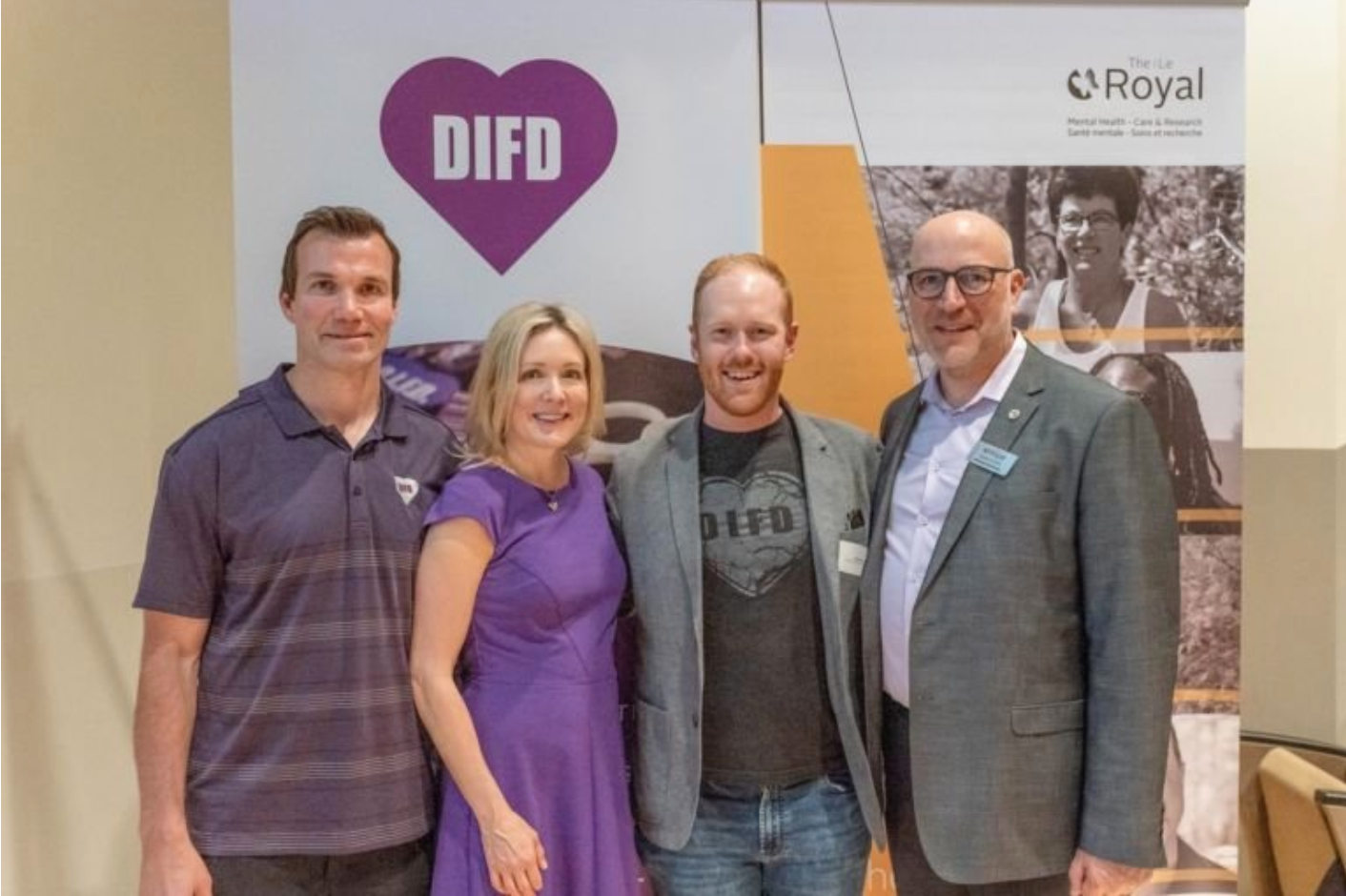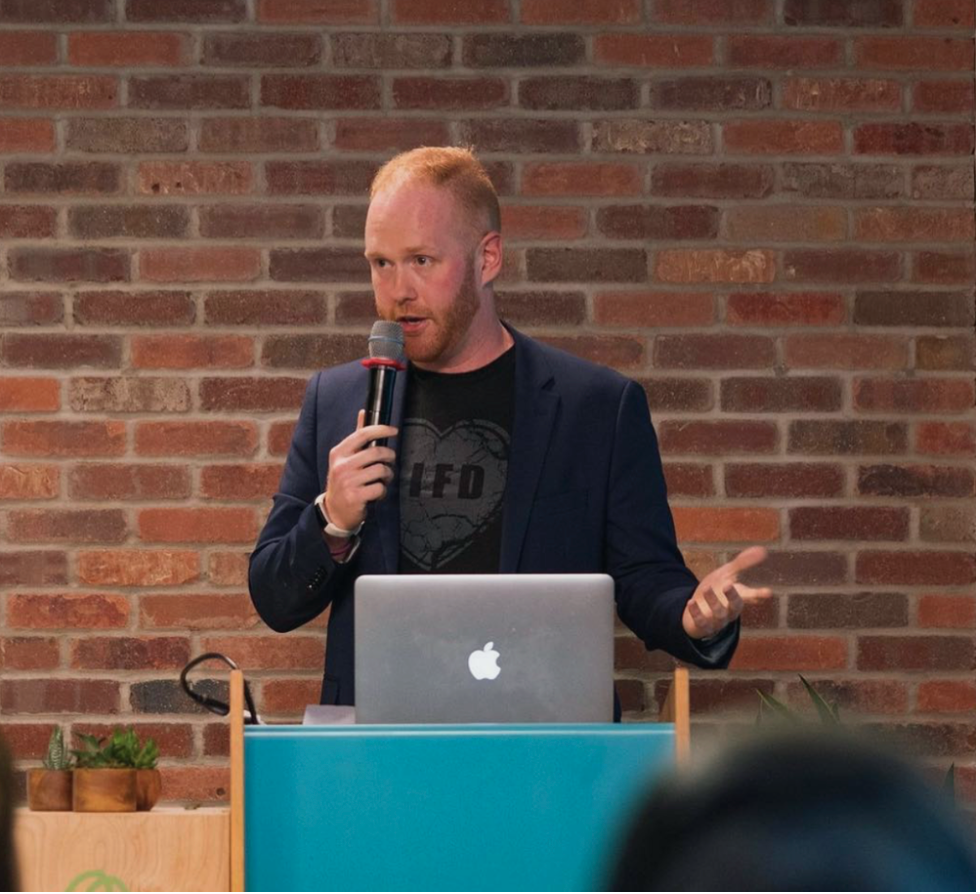When mental illness isn’t trauma based: Ryan’s path to wellness
My name is Ryan Forsyth. I’m a mental health speaker and advocate, the host of the Life in Red Podcast and I work in radio promotions, doing marketing, contests and events in Ottawa, Ontario, Canada. I describe myself as a music geek, sports fanatic and endlessly curious. I also live with a mental illness, struggling with anxiety, depression and suicidal thoughts.
I thought a lot about what I wanted to write when asked to share my story. Sure, I could tell you I first started experiencing anxiety and panic attacks when I was 14. I could tell you that my first experience with depression was at 16. There was also the time I tried to take my life when I was 21 and how even when I finally got help; I have continually had difficultly navigating my way through my mental illness since. However, when I actually sat down to write this, I wondered how I could make an impact. Chances are if you are reading this, you or someone you know struggles living with a mental illness. You most likely already know, or at least have an idea, of what it’s like. So instead, I want to try to offer a glimmer of hope or inspiration. I’m going to use my gift of being incredibly candid and open about my story to offer a different path. I want young people to understand that it is okay to talk about what they’re going through and I want older people to understand that being open about their struggles can be one of the most freeing feelings.
Let me start by saying I grew up in an upper middle-class family who was loving and supportive in every way possible. I had everything I ever wanted. I played a high level of hockey; I was popular growing up with a ton of friends. I don’t have a story that, unfortunately, so many other people have. There’s never been major trauma, neglect or abuse. I’ve never had addiction or substance abuse issues. I didn’t even have a major death in my family until well into my twenties. Yet, I’ve never been able to shake this overwhelming feeling of loneliness and sadness. You could imagine how confusing it was trying to figure out and understand why I feel this way, when I have everything society tells you you’re supposed to have.
When I was 21, everything changed for me. I had just finished college and received a job right out of school in my field. However, a few months into it, they let me go. Add on top of that the issues I was ignoring. I was in relationship I wasn’t happy in. I gained a bunch of weight from college and had a depleted ego and sense of self worth. All the friends I grew up with were off doing other things in different places. Every day I would drive into work and feel like I was going to break down into tears. Every morning my anxiety was so bad, I would throw up before work. I decided and tried to take my own life. Even just 6 years ago, I didn’t truly understand what was going on. No one was publicly talking about depression, anxiety, suicide or even mental health. I don’t think Bell Let’s Talk Day was even around yet.
It wasn’t necessarily stigma surrounding mental health that lead me to locking in my emotions. It’s that I was so young, I didn’t see the signs or understand the feelings to recognize this was something I should be sharing with someone.
I never told anyone about this attempt until a few years later, mostly because I knew it would break my family’s heart. I did know enough to recognize the feeling of “not wanting to live anymore” was a wake up call. I decided I needed help. I just couldn’t live like this anymore. I went to my parents who then told me to go to the doctor who diagnosed me with depression and an anxiety disorder. I started on medication, received some therapy and things started to get back on track.
In 2015, things were sliding again. I’m not sure what came over me, but I decided to tweet out a thread of how I actually felt and about my suicide attempt on Bell Let’s Talk Day for the first time publicly. It kind of went viral. To most people who knew me at the time, they were in complete shock. I was always known as the happy, smiling guy. I was always laughing and making people laugh (tell me if you’ve heard that one before). What surprised me was the overwhelming response of support. Friends, family, acquaintances and even complete strangers reached out to me. Some shared their stories and others offered support. I couldn’t believe it. One, the amount of people who cared and two, the amount of people who were going through the same types of feelings as me. It was that moment I knew I wasn’t alone, and that my words and sharing my story had power.
When I found out that sharing my story was somehow helping other people, I continued to share it on social media, being brutally honest with my feelings. Slowly, I’ve started to see the stigma dissipate over the years with more and more people talking openly about their mental health. However, coming from a job that works with so many different charities, I realized that while talking about mental health was great, it was putting more strain on the system. What I felt we needed was funding.
During October of 2017, I was just about to leave the office for a young leadership program I was in at our head office in Toronto, when my boss called me in to her office and asked what was going on. What I thought I was hiding was obvious to the people who knew me: once again, I was struggling. I opened up and told her everything. My feelings of low self-esteem, anxiety of job security and the stress of work that made me suicidal. Because I was leaving, we didn’t have a chance to resolve things, but we promised to meet when I got back. That left me with an 8-hour drive to Toronto and back to think about things. I decided that I wanted to do something for mental health, because I felt that helping people would make me feel better. I asked if I could come up with some sort of event and have the support of the stations behind it. I honestly had no idea what I wanted to do yet, but I just wanted the blessing. That’s when the idea for Cause for Paws came to life. I wanted to combine 2 things I knew people would respond to; dogs and mental health. I had a platform that charities so desperately wanted, with hundreds of thousands of people listening to our message. I used my job to create a 5-day event across Ottawa that encouraged people to come make a donation and pet some adoptable rescue dogs, all in support of Dog Rescue and Mental Health. We ended up raising $5,500 in year 1 and $6,500 in year 2.
So where does that leave me now? You would think that after I told you how great all these things worked out, that there would be a happy ending. Unfortunately, that’s not quite how mental illness works.
Don’t get me wrong, I have some good days but I have also bad days. Then I have really bad days. I like to think of my mental health as another full time job. I’m very proactive in searching for things I can do to help manage it. I do all the traditional things mental health resources point me to. I have my support system, I’m on medication; I exercise regularly, eat a mostly healthy diet, read, listen, meditate, and make connections with people. I find the 2 biggest things that help are learning new things and helping people. That’s what I try to do every single day. My podcast has allowed me to connect with people in the field or who’ve had their own experience with mental illness. Thanks to my episode with Ana Santos, A PHD student in Neuroscience, I’m all about probiotics and trying to learn about my gut microbiome and how it affects my mental health. I’ve slowly been experimenting with meditation thanks to a few guests, but that’s been a slow build (it’s hard when your mind is always racing, but that’s probably why it helps). I understand the importance of exercise and movement to my overall health. I’ve even been trying mushroom coffee with Lions Mane, because the internet told me it’s good for my brain! I make my bed every morning because some psychologists say completing a task first thing in the morning is supposed to get you motivated. Do I recommend you do all these things too? Well, that is really up to you. This all may seem silly, but I need routine and discipline in my life to keep me on track, so if I fall off the tracks, I at least have a rope of tasks I know I need to get done. I’m also terrified that if I stop and spend a day in bed, I won’t ever get back out. You need to figure out what works for you, because doing nothing doesn’t help you. I even began recently seeing a therapist again. I thought I had the tools and answers to tackle my mental illness on my own. Once I began publicly speaking about mental health and sharing my story with youth, peers and professionals, I realized I didn’t quite have it together like I thought I did. See, when you start to take an introspective look into your own story and critically examine where you’re realistically at presently, you have to be honest with yourself. I don’t want to lie to these people; I want them to know the truth. That truth is, when I’m standing in front of people, talking behind a microphone, or sharing something personal on my social media, I don’t have all the answers.
My mental illness story isn’t over and I don’t know if it ever will be. I wish I could say that after everything I’ve done, I’m okay and it’s the end, but it’s not. This is a daily battle and I have to out work my demons every single day.
If I can leave you with anything today, it’s this: mental illness or not, make your mental health a priority in your life and figure out what works for you. Be open and don’t hide how you’re feeling. You don’t have to tell everyone, but you need to tell someone. Treat yourself like you’re someone you care about. To me, self-love isn’t trying to accept myself as “perfect” the way I am. It’s learning new things, forgiving the mistakes you’ve made and will make, growing as a person, understanding your flaws and working on them, deepening your understanding of people, expanding on your ideas, listening and working on your health. It’s doing your best and improving as a human. When you have a mental illness, or for those of you who don’t, it’s our responsibility to try to be our best for ourselves and for each other every single day. That starts by treating your mental health like a full time job.
Unsinkable Storytelling Author: Ryan Forsyth



